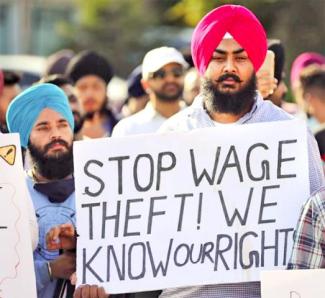HIGHWAY ROBBERY
Long-haul truckers take direct action to recover wages stolen by bosses

TRUCKERS IN BRAMPTON WANT WHAT’S THEIRS. What they’re doing to get it is exceptional, brave and has been more than worth it, for more than one driver.
The drivers have created the Naujawan Support Network (NSN) to be their own champions in a constant battle to get trucking companies to stop cheating them out of the pay and benefits they are entitled to by law.
A pattern of systemic abuse
Long-haul trucking is regulated by the federal government. Over the past three years, long-haul truck drivers have lodged more than 4,800 complaints with Employment and Social Development Canada (ESDC) for unpaid wages and other employment abuses. That is more than 12 times the number filed in any other federally regulated sector, though truckers make up less than a fifth of that workforce.
Despite persistent patterns of non-compliance by trucking companies, Ottawa has conducted fewer than a 100 inspections of federally regulated trucking companies for wage violations since 2019. It hasn’t issued a single fine after implementing its new penalties system this January.
This driver exploitation is one consequence of what industry experts describe as a “billion dollar scam” left to fester in the trucking sector. It’s known as “Driver Inc.”: the deliberate misclassification of workers as self-employed to cut costs by evading basic labour protections, payroll taxes and other legal obligations.
The manoeuvre makes it harder for workers to claim overtime, holiday pay and even minimum wage or injury compensation in the event of a road accident.
Direct action
Seeing the odds stacked against them in courts and the complaints system, the Naujawan Support Network has used public protest and direct action at the homes of company owners to successfully recover wages they say they’re owed.
Company owners have retaliated with defamation law suits to criminal harassment charges.
To Arshdeep Singh, a Naujawan Support Network member and driver, it is all part of an effort by company owners to direct public interest away from the issue and to intimidate workers who feel particularly vulnerable because of precarious immigration status and high student debt.
Singh says he is undeterred. The scale of the issue, he adds, demands action.
“We do not feel scared,” he said. “We have to raise our voice.
The NSN approach is respectful but persistent.
Driver Paras Manocha is owed more than $10,000 from a trucking job he found with Cargo Transport on Kijiji. But getting his pay he says, has been a protracted nightmare.
Manocha sent a series of emails to the company to ask for his money. In January he wrote: “Hello brother, please get my cheques ready today.”
In mid-February he wrote: “Brother, please get the cheque made. Someone, please call me back.” No one did.
The emails are part of evidence in a complaint Manocha submitted under the Canada Labour Code. Federal regulators ruled Cargo Transport owed Manocha his wages and vacation pay.
Orders to pay not enforced
It’s one of almost 1,000 payment orders issued to trucking companies by federal authorities over the past three years.
But six months after winning his claim, Manocha says he still hasn’t received any money. Instead, he’s been served with a $50,000 defamation suit by a former director of Cargo Transport after protesters gathered outside his home demanding payment.
Sometimes, the fallout is worse, said Singh. A driver at a different company recently confided in him that he considered taking his own life after selling all his furniture to pay rent amid a wage dispute.
The Naujawan Support Network exists to enable workers to confront and overcome these pressures themselves, says Singh. It is founded on the idea that coming together can be a potent antidote to the isolation and stress caused by poor working conditions.
By joining forces to directly ask — and sometimes shame — their employers into paying up, the network’s members believe they are leveraging their best resource: power in numbers.
- 30 -













Add new comment